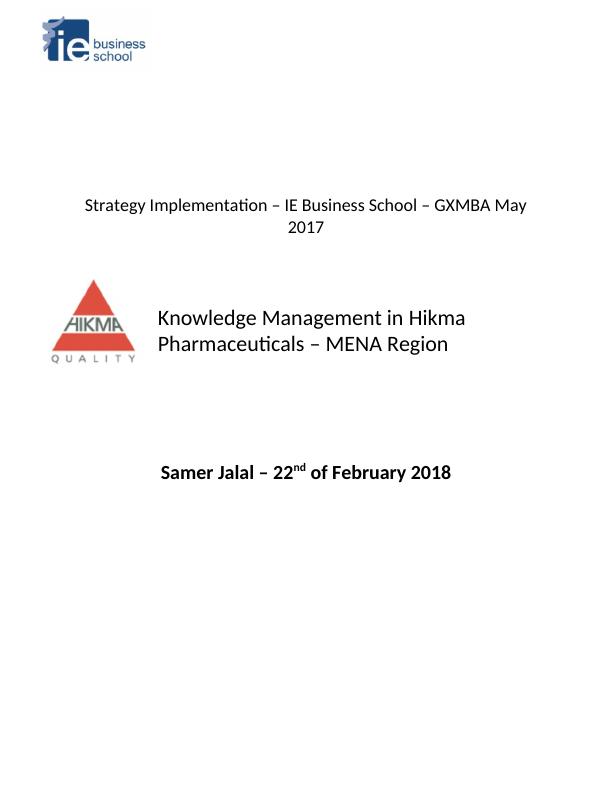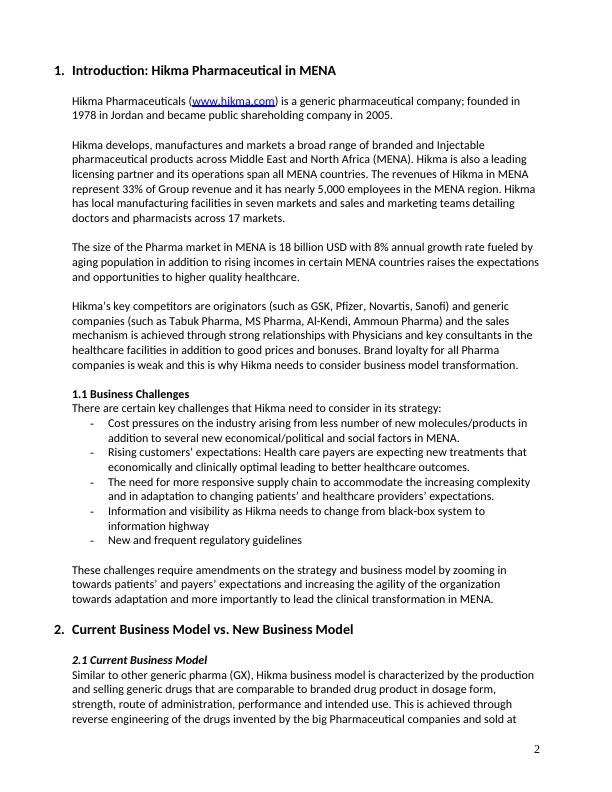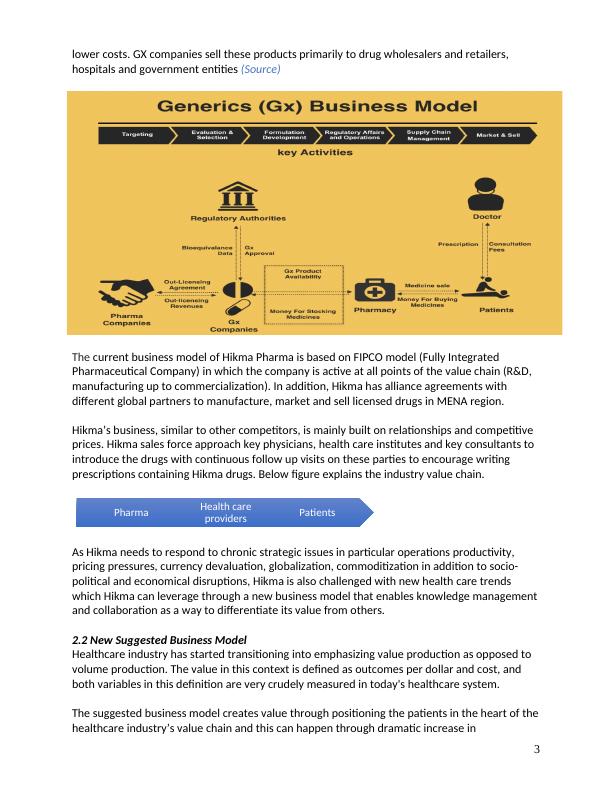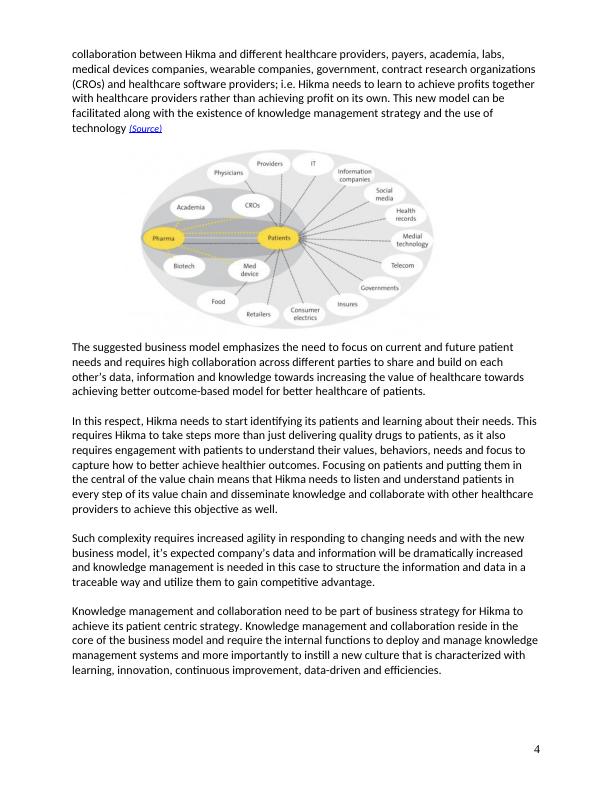Knowledge Management Strategy for Hikma Pharmaceuticals in MENA Region
Added on 2023-06-15
12 Pages3893 Words135 Views
Strategy Implementation – IE Business School – GXMBA May
2017
Knowledge Management in Hikma
Pharmaceuticals – MENA Region
Samer Jalal – 22nd of February 2018
2017
Knowledge Management in Hikma
Pharmaceuticals – MENA Region
Samer Jalal – 22nd of February 2018

1. Introduction: Hikma Pharmaceutical in MENA
Hikma Pharmaceuticals (www.hikma.com) is a generic pharmaceutical company; founded in
1978 in Jordan and became public shareholding company in 2005.
Hikma develops, manufactures and markets a broad range of branded and Injectable
pharmaceutical products across Middle East and North Africa (MENA). Hikma is also a leading
licensing partner and its operations span all MENA countries. The revenues of Hikma in MENA
represent 33% of Group revenue and it has nearly 5,000 employees in the MENA region. Hikma
has local manufacturing facilities in seven markets and sales and marketing teams detailing
doctors and pharmacists across 17 markets.
The size of the Pharma market in MENA is 18 billion USD with 8% annual growth rate fueled by
aging population in addition to rising incomes in certain MENA countries raises the expectations
and opportunities to higher quality healthcare.
Hikma’s key competitors are originators (such as GSK, Pfizer, Novartis, Sanofi) and generic
companies (such as Tabuk Pharma, MS Pharma, Al-Kendi, Ammoun Pharma) and the sales
mechanism is achieved through strong relationships with Physicians and key consultants in the
healthcare facilities in addition to good prices and bonuses. Brand loyalty for all Pharma
companies is weak and this is why Hikma needs to consider business model transformation.
1.1 Business Challenges
There are certain key challenges that Hikma need to consider in its strategy:
- Cost pressures on the industry arising from less number of new molecules/products in
addition to several new economical/political and social factors in MENA.
- Rising customers’ expectations: Health care payers are expecting new treatments that
economically and clinically optimal leading to better healthcare outcomes.
- The need for more responsive supply chain to accommodate the increasing complexity
and in adaptation to changing patients’ and healthcare providers’ expectations.
- Information and visibility as Hikma needs to change from black-box system to
information highway
- New and frequent regulatory guidelines
These challenges require amendments on the strategy and business model by zooming in
towards patients’ and payers’ expectations and increasing the agility of the organization
towards adaptation and more importantly to lead the clinical transformation in MENA.
2. Current Business Model vs. New Business Model
2.1 Current Business Model
Similar to other generic pharma (GX), Hikma business model is characterized by the production
and selling generic drugs that are comparable to branded drug product in dosage form,
strength, route of administration, performance and intended use. This is achieved through
reverse engineering of the drugs invented by the big Pharmaceutical companies and sold at
2
Hikma Pharmaceuticals (www.hikma.com) is a generic pharmaceutical company; founded in
1978 in Jordan and became public shareholding company in 2005.
Hikma develops, manufactures and markets a broad range of branded and Injectable
pharmaceutical products across Middle East and North Africa (MENA). Hikma is also a leading
licensing partner and its operations span all MENA countries. The revenues of Hikma in MENA
represent 33% of Group revenue and it has nearly 5,000 employees in the MENA region. Hikma
has local manufacturing facilities in seven markets and sales and marketing teams detailing
doctors and pharmacists across 17 markets.
The size of the Pharma market in MENA is 18 billion USD with 8% annual growth rate fueled by
aging population in addition to rising incomes in certain MENA countries raises the expectations
and opportunities to higher quality healthcare.
Hikma’s key competitors are originators (such as GSK, Pfizer, Novartis, Sanofi) and generic
companies (such as Tabuk Pharma, MS Pharma, Al-Kendi, Ammoun Pharma) and the sales
mechanism is achieved through strong relationships with Physicians and key consultants in the
healthcare facilities in addition to good prices and bonuses. Brand loyalty for all Pharma
companies is weak and this is why Hikma needs to consider business model transformation.
1.1 Business Challenges
There are certain key challenges that Hikma need to consider in its strategy:
- Cost pressures on the industry arising from less number of new molecules/products in
addition to several new economical/political and social factors in MENA.
- Rising customers’ expectations: Health care payers are expecting new treatments that
economically and clinically optimal leading to better healthcare outcomes.
- The need for more responsive supply chain to accommodate the increasing complexity
and in adaptation to changing patients’ and healthcare providers’ expectations.
- Information and visibility as Hikma needs to change from black-box system to
information highway
- New and frequent regulatory guidelines
These challenges require amendments on the strategy and business model by zooming in
towards patients’ and payers’ expectations and increasing the agility of the organization
towards adaptation and more importantly to lead the clinical transformation in MENA.
2. Current Business Model vs. New Business Model
2.1 Current Business Model
Similar to other generic pharma (GX), Hikma business model is characterized by the production
and selling generic drugs that are comparable to branded drug product in dosage form,
strength, route of administration, performance and intended use. This is achieved through
reverse engineering of the drugs invented by the big Pharmaceutical companies and sold at
2

lower costs. GX companies sell these products primarily to drug wholesalers and retailers,
hospitals and government entities (Source)
The current business model of Hikma Pharma is based on FIPCO model (Fully Integrated
Pharmaceutical Company) in which the company is active at all points of the value chain (R&D,
manufacturing up to commercialization). In addition, Hikma has alliance agreements with
different global partners to manufacture, market and sell licensed drugs in MENA region.
Hikma’s business, similar to other competitors, is mainly built on relationships and competitive
prices. Hikma sales force approach key physicians, health care institutes and key consultants to
introduce the drugs with continuous follow up visits on these parties to encourage writing
prescriptions containing Hikma drugs. Below figure explains the industry value chain.
As Hikma needs to respond to chronic strategic issues in particular operations productivity,
pricing pressures, currency devaluation, globalization, commoditization in addition to socio-
political and economical disruptions, Hikma is also challenged with new health care trends
which Hikma can leverage through a new business model that enables knowledge management
and collaboration as a way to differentiate its value from others.
2.2 New Suggested Business Model
Healthcare industry has started transitioning into emphasizing value production as opposed to
volume production. The value in this context is defined as outcomes per dollar and cost, and
both variables in this definition are very crudely measured in today's healthcare system.
The suggested business model creates value through positioning the patients in the heart of the
healthcare industry’s value chain and this can happen through dramatic increase in
Pharma Health care
providers Patients
3
hospitals and government entities (Source)
The current business model of Hikma Pharma is based on FIPCO model (Fully Integrated
Pharmaceutical Company) in which the company is active at all points of the value chain (R&D,
manufacturing up to commercialization). In addition, Hikma has alliance agreements with
different global partners to manufacture, market and sell licensed drugs in MENA region.
Hikma’s business, similar to other competitors, is mainly built on relationships and competitive
prices. Hikma sales force approach key physicians, health care institutes and key consultants to
introduce the drugs with continuous follow up visits on these parties to encourage writing
prescriptions containing Hikma drugs. Below figure explains the industry value chain.
As Hikma needs to respond to chronic strategic issues in particular operations productivity,
pricing pressures, currency devaluation, globalization, commoditization in addition to socio-
political and economical disruptions, Hikma is also challenged with new health care trends
which Hikma can leverage through a new business model that enables knowledge management
and collaboration as a way to differentiate its value from others.
2.2 New Suggested Business Model
Healthcare industry has started transitioning into emphasizing value production as opposed to
volume production. The value in this context is defined as outcomes per dollar and cost, and
both variables in this definition are very crudely measured in today's healthcare system.
The suggested business model creates value through positioning the patients in the heart of the
healthcare industry’s value chain and this can happen through dramatic increase in
Pharma Health care
providers Patients
3

collaboration between Hikma and different healthcare providers, payers, academia, labs,
medical devices companies, wearable companies, government, contract research organizations
(CROs) and healthcare software providers; i.e. Hikma needs to learn to achieve profits together
with healthcare providers rather than achieving profit on its own. This new model can be
facilitated along with the existence of knowledge management strategy and the use of
technology (Source)
The suggested business model emphasizes the need to focus on current and future patient
needs and requires high collaboration across different parties to share and build on each
other’s data, information and knowledge towards increasing the value of healthcare towards
achieving better outcome-based model for better healthcare of patients.
In this respect, Hikma needs to start identifying its patients and learning about their needs. This
requires Hikma to take steps more than just delivering quality drugs to patients, as it also
requires engagement with patients to understand their values, behaviors, needs and focus to
capture how to better achieve healthier outcomes. Focusing on patients and putting them in
the central of the value chain means that Hikma needs to listen and understand patients in
every step of its value chain and disseminate knowledge and collaborate with other healthcare
providers to achieve this objective as well.
Such complexity requires increased agility in responding to changing needs and with the new
business model, it’s expected company’s data and information will be dramatically increased
and knowledge management is needed in this case to structure the information and data in a
traceable way and utilize them to gain competitive advantage.
Knowledge management and collaboration need to be part of business strategy for Hikma to
achieve its patient centric strategy. Knowledge management and collaboration reside in the
core of the business model and require the internal functions to deploy and manage knowledge
management systems and more importantly to instill a new culture that is characterized with
learning, innovation, continuous improvement, data-driven and efficiencies.
4
medical devices companies, wearable companies, government, contract research organizations
(CROs) and healthcare software providers; i.e. Hikma needs to learn to achieve profits together
with healthcare providers rather than achieving profit on its own. This new model can be
facilitated along with the existence of knowledge management strategy and the use of
technology (Source)
The suggested business model emphasizes the need to focus on current and future patient
needs and requires high collaboration across different parties to share and build on each
other’s data, information and knowledge towards increasing the value of healthcare towards
achieving better outcome-based model for better healthcare of patients.
In this respect, Hikma needs to start identifying its patients and learning about their needs. This
requires Hikma to take steps more than just delivering quality drugs to patients, as it also
requires engagement with patients to understand their values, behaviors, needs and focus to
capture how to better achieve healthier outcomes. Focusing on patients and putting them in
the central of the value chain means that Hikma needs to listen and understand patients in
every step of its value chain and disseminate knowledge and collaborate with other healthcare
providers to achieve this objective as well.
Such complexity requires increased agility in responding to changing needs and with the new
business model, it’s expected company’s data and information will be dramatically increased
and knowledge management is needed in this case to structure the information and data in a
traceable way and utilize them to gain competitive advantage.
Knowledge management and collaboration need to be part of business strategy for Hikma to
achieve its patient centric strategy. Knowledge management and collaboration reside in the
core of the business model and require the internal functions to deploy and manage knowledge
management systems and more importantly to instill a new culture that is characterized with
learning, innovation, continuous improvement, data-driven and efficiencies.
4

End of preview
Want to access all the pages? Upload your documents or become a member.
Related Documents
Strategy Implementation Assignmentlg...
|12
|3542
|34
Pharmaceutical Industry: Challenges and Strategieslg...
|11
|2961
|38
Financial Reporting and Analysis - Assessment 2 Reportlg...
|14
|3886
|148
Accounting and Financial Reporting in the Pharmaceutical Industrylg...
|6
|788
|74
DHG Pharmaceutical JSC Assignmentlg...
|15
|5683
|417
PHARMA CORPORATIONS PHARMA CORPORATIONS Introductionlg...
|21
|4911
|500
